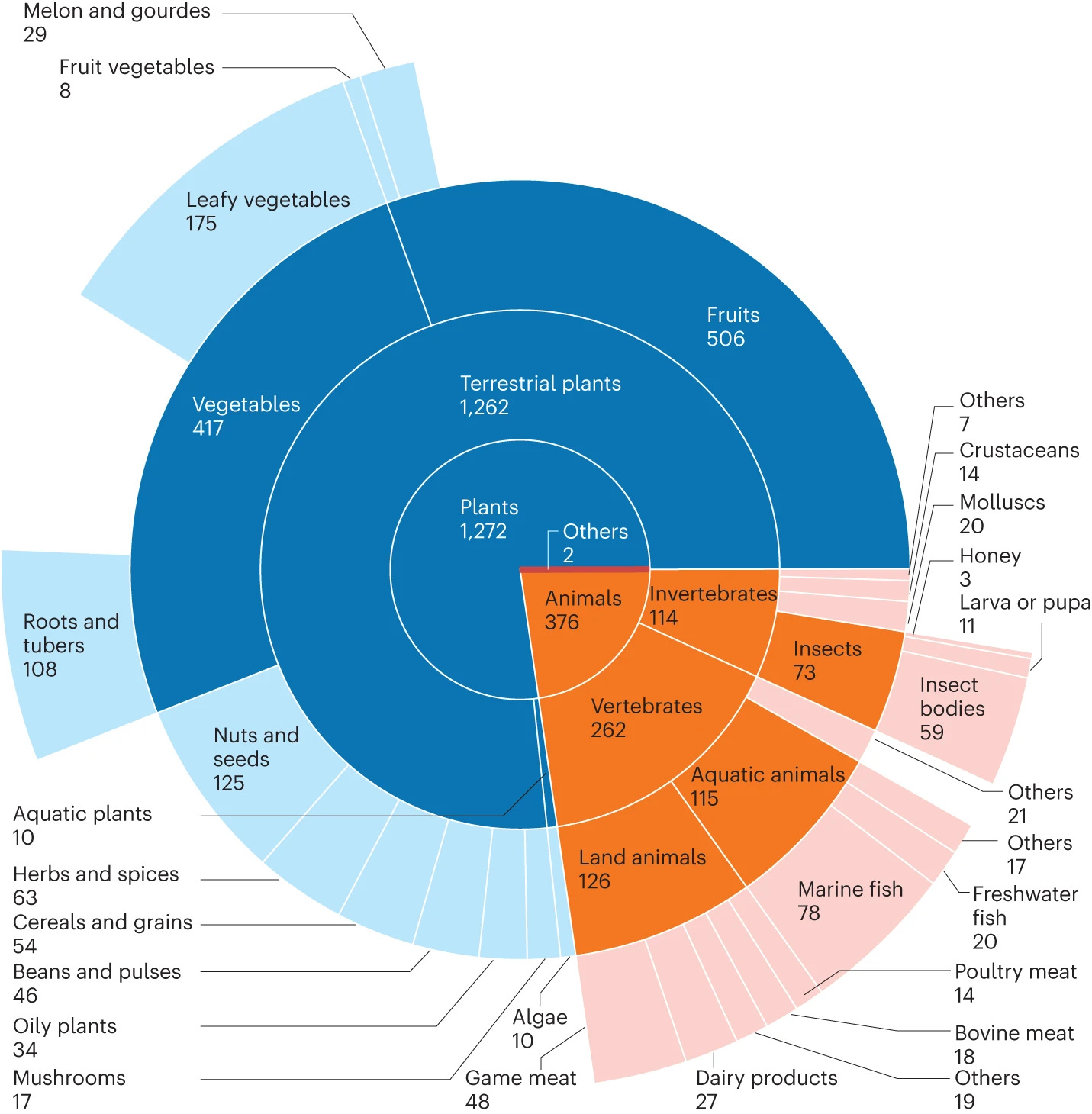New Research on Foods from Around the World
I share highlights from a recently published article on edible biodiversity.

Gaps in our understanding of food composition stem from the inherent diversity of food, influenced by its production, storage, distribution, and processing methods, as well as technological and accessibility challenges. The vast biodiversity of edible items on Earth includes around 26,000 biomolecules, most of which remain unidentified. The health impacts of these molecules are largely unexplored, making them the equivalent of nutrition's 'dark matter'.
The Periodic Table of Food Initiative addresses food biomolecular composition information gaps through a standardized, accessible and enabling platform based on analytical tools, data and capacity building. Data from 1,650 foods serve as starting point for demonstrating the capacity of this initiative to contribute to nutrition, health and food systems transformations.
I am part of a large collaborative addressing the biomolecular composition of foods consumed around the world. We recently published an article in the scientific journal, Nature Foods, which describes the platform being used to explore the biomolecular diversity of thousands of foods.
Jarvis A, Gallo-Franco J, Portilla J, German B, Debouck D, Rajasekharan M, Khoury C, Herforth A, Ahmed S, Tohme J, Arnaud E, Golden CD, Dawid C, de Haan S, DeClerck F, Feskens EJM, Fogliano V, Fritz G, Hald C, Hall R, Hart R, Henry A, Huang S, Hunter D, Imanbaeva B, Lowe A, Turner NJ, Jia G, Johnson E, Kalaiah G, Karboune S, Klade S, La Cerva GR, Lal V, Levy AA, Longvah T, Maeda-Yamamoto M, Minnis P, Nuti M, Octavio M, Osorio C, Pawera L, Peter S, Prasad R, Quave C, Shapiro HY, Sreeman S, Srichamnong W, Steiner R, Turdieva M, Ulian T, van Andel T, Wang R, Weissgold L, Yan J, de la Parra J. Periodic Table of Food Initiative for generating biomolecular knowledge of edible biodiversity. Nat Food. 2024 Mar;5(3):189-193. doi: 10.1038/s43016-024-00941-y. Nat Food. 2024 Mar 18;: PMID: 38459394.
How does the PTFI platform work?
The Periodic Table of Food Initiative (PTFI) is working to identify what's in our food on a molecular level, by creating a worldwide network that uses cutting-edge science and shared tools to study the variety of foods we eat.
PTFI is making these studies consistent and innovative, using new tech to measure and analyze food molecules, aiming to advance research in nutrition, health, farming, and the environment.
The initiative is making its findings easy for everyone to access and use, through free online resources, training, and tools for exploring food data. This will help people everywhere understand food better and find solutions for healthier food systems.
PTFI's goal is to use this detailed food information to tackle big problems like obesity, malnutrition, environmental damage, loss of plant and animal species, and climate change, by encouraging collaboration and ethical sharing of knowledge worldwide.
How did we pick foods to focus on?
PTFI chose foods to analyze based on a worldwide effort to identify minimally processed, single-species foods important for both nutrition and culture. Teams from different regions nominated foods that are widely eaten, culturally significant, or expected to be important in future diets, resulting in a list of 1,671 food nominations.
Additional sources like the African orphan crops list, the Global Diet Quality Questionnaire, and lists focusing on underutilized species and those with high nutritional potential expanded the nominations. This brought in foods common worldwide and those with potential for future importance, adding 851 more items plus 152 from focused lists.
Expert review identified gaps such as foods from the South Pacific, fermented items, seafood, insects, and mushrooms, leading to 294 new nominations. Efforts were made to standardize terms and add information like taxonomic names and threat status, excluding foods listed as endangered unless they were domesticated.
Creating a global list of foods

The Takeaway
The PTFI aims to kickstart its exploration of global food biomolecules with a collaborative and geographically diverse list, recognizing the crucial role of biological diversity in human diets and nutrition. By engaging with a broader community and focusing on underrepresented food groups, alongside developing tools and standards for analyzing food composition, PTFI seeks to enhance global nutrition knowledge and contribute to healthier and more sustainable food systems.
Want to learn more and stay up to date with new findings in this space? Visit the PTFI website (https://foodperiodictable.org/) for news, upcoming events, and more!
Yours in health, Dr. Quave
Cassandra L. Quave, Ph.D. is a scientist, author, speaker, podcast host, wife, mother, explorer, and professor at Emory University School of Medicine. She teaches college courses and leads a group of research scientists studying medicinal plants to find new life-saving drugs from nature. She hosts the Foodie Pharmacology podcast and writes the Nature’s Pharmacy newsletter to share the science behind natural medicines. To support her effort, consider a paid or founding subscription, with founding members receiving an autographed 1st edition hardcover copy of her book, The Plant Hunter.
Available in hardcover, paperback, audio, and e-book formats!





